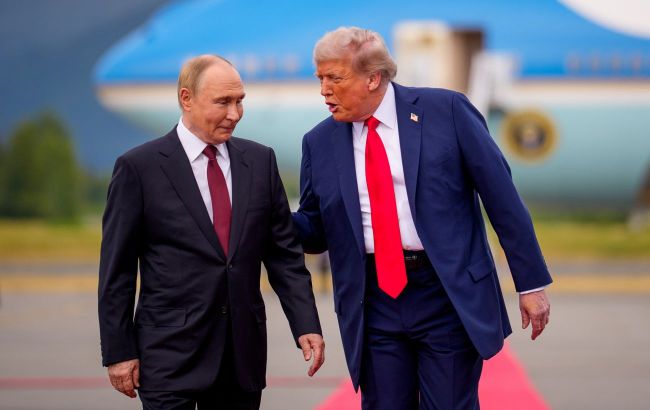Trump's ultimatum. Why US is holding back on secondary sanctions on Russian oil
 US and Russian Presidents Donald Trump and Vladimir Putin (photo: Getty Images)
US and Russian Presidents Donald Trump and Vladimir Putin (photo: Getty Images)
US President Donald Trump issued an ultimatum to Europe, holding back on imposing secondary sanctions against buyers of Russian oil. Why did he choose to raise the issue with Hungarian Prime Minister Viktor Orbán, and is there a chance to pressure Russia? Read the RBC-Ukraine article on the topic.
For several months, US President Donald Trump has been threatening to impose additional tariffs on goods from countries that buy oil from Russia. In essence, this would be a sanction against Russia, as such a step should theoretically force countries to abandon purchases of Russian oil and significantly reduce the aggressor state’s revenues.
Using the fact of India’s Russian oil imports, Trump in August imposed trade sanctions on goods from that country. But he did not do the same with China, Russia’s biggest oil buyer.
So far, the American tariffs have not had the desired effect. India continues to buy Russian oil, though import volumes may decline slightly by the end of the year.
Maintaining the image of a tough politician, in September, Trump set a condition for applying secondary tariffs. He declared that he could introduce them only after EU and NATO countries also stop buying Russian oil.
"I am ready to do major sanctions on Russia when all NATO nations have agreed, and started, to do the same thing, and when all NATO nations stop buying oil from Russia," Trump said on September 13.
Just 10 days later, he again voiced frustration at the ongoing purchases of Russian oil.
Trump noted it was unacceptable that even NATO countries had not stopped buying Russian energy, adding that he did not like it and that, in essence, they were financing a war against themselves.
Who in NATO has to give up Russian oil
When Trump talks about EU and NATO members, he primarily means Slovakia and Hungary, which continue to buy Russian oil. These two countries received an indefinite exemption from the European Commission and were not covered by its 2022 decision banning imports of Russian oil. Overall, purchases from Russia account for just 3% of the EU's crude oil imports, compared to about 27% before the start of Russia's full-scale war against Ukraine.
Among NATO members outside the EU, only Türkiye continues to buy oil from Russia. It remains the third-largest importer of Russian oil after China and India. In 2024, imports amounted to over 15 million tons.
Russian oil is processed at Turkish refineries. The resulting gasoline, diesel, fuel oil, and jet fuel are used domestically and exported to other countries, already labeled as Turkish products. Buyers of Turkish petroleum products, mostly diesel, include EU countries.
Slovakia and Hungary's position
In early September, Volodymyr Zelenskyy met with Slovak Prime Minister Robert Fico to discuss the issue of Russian oil purchases.
Zelenskyy said he had a "long conversation" with Fico and understands the difficulty Slovakia faces in finding alternatives to Russian oil. "I know the difficulties related to the logistics of energy supply in European countries... I fully understand Slovakia. They're probably ready to look for alternative routes and that's good news. But the bad news is that Hungary's Prime Minister (Viktor Orbán - ed.) is not ready for this yet. I think that's a mistake. But the whole of Hungary shouldn't have to pay for the mistake of one man," Zelenskyy said.
Russian oil reaches Hungary through the Druzhba pipeline via Ukraine. Part of the crude then goes to refineries in Slovakia, owned by Hungarian company MOL.
Budapest has already responded to Trump's words, saying it sees no alternative to Russian oil supplies. "We fully support the US President's efforts to promote peace, but we cannot change the reality of our geographical situation," Hungarian Foreign Minister Péter Szijjártó said.
Szijjártó stressed that Hungary has no way to replace the existing pipeline supply route for not only oil but also gas with a maritime one.
"We're a landlocked country. It would be ideal if we could access the sea, build a refinery or LNG terminal, and connect to the global market. But that is not the case," Hungary’s top diplomat emphasized.
Trump counts on Orbán
But Trump seems to see a chance to secure Hungary's consent to abandon Russian oil purchases. "He (Viktor Orbán - ed.) is a friend of mine. I have not spoken to him, but I have a feeling that if I did, he might stop. And I think I'll be doing that," the US President said.
Zelenskyy also hopes Trump will be able to persuade Orbán to give up Russian oil. "I hope President Trump will resolve this issue. He knows Orbán," Zelenskyy stated. He also believes other EU leaders should talk to the Hungarian Prime Minister on this matter.
However, in Zelenskyy's view, the US could impose sanctions without waiting for the EU to give up Russian oil purchases.
"The US can take strong steps on its own, and we would very much like that. The US wants parallel processes - their steps and processes in European countries. And I told the President that we would very much like the US... They themselves can take such strong steps," Zelenskyy said.
Ukrainian leader also noted that the EU might face disagreements on this issue, and decision-making could be delayed. "You know how big Europe is and how sometimes there's no unity on certain issues. So it may not be worth waiting (for an EU decision - ed.). We'd like America to move forward. That's what we're talking about," Zelenskyy said.
Sanctions pressure may weaken
But instead of increasing, sanctions pressure may actually weaken - possibly as early as the start of winter.
As part of its 18th sanctions package, the EU lowered the price cap for Russian oil from $60 to $47.6 per barrel, effective in September. The principle of the cap is as follows: the average oil price over the last three months minus 15%. Based on this formula, the average oil price at the time of setting the cap was $56 per barrel.
A review of the cap is scheduled after three months. Given that oil prices in August and September were above $60, a revision could raise the cap, which would play into Russia's hands. However, Mykhailo Gonchar, President of the Strategy XXI Center for Global Studies, believes a consensus on revising the cap is unlikely.
As for oil purchases, he argues that Slovakia and Hungary could replace Russian oil with supplies from Azerbaijan. Hungary's largest oil and gas company, MOL, holds up to a 10% stake in the Azeri-Chirag-Gunashli oil fields and in the Baku-Tbilisi-Ceyhan pipeline.
"I think the US will find people to show Orbán a map, in case he and Szijjártó forgot something. They'll point out where the Adria pipeline is (connecting the seaport terminal in Croatia with Hungary and Slovakia - ed.) and even suggest buying American oil. If this issue has reached the level of the US President, then obviously there's lobbying going on (to replace the source of oil - ed.)," Honchar said.
Furthermore, US Energy Secretary Chris Wright has already stated that all Russian gas and oil entering the EU could be replaced by American resources. "America stands ready today to displace all of the Russian gas that goes into Europe and all of the Russian refined products from oil as well," Wright stated.
But even now, despite public statements about the impossibility of abandoning Russian oil, the Hungarians are probing alternative routes. "MOL is preparing a tanker; it may already have left Türkiye's Ceyhan with Azerbaijani Azeri Light crude. It will enter Croatia via the Mediterranean and then go by pipeline into Hungary," Honchar reported.
In fact, if Trump's expectations prove right and Hungary, along with Slovakia, eventually stop buying Russian oil, then theoretically, the chances of US secondary sanctions against Russia being introduced will increase. But only if the US President does not demand his conditions be fully met - that is, not waiting for Türkiye to abandon Russian oil imports. For now, experts remain skeptical about such a possibility. A greater impact is expected from increasing oil production and lowering prices.
In October, OPEC+ countries plan to continue the production hike launched back in April. Daily output will rise by 137,000 barrels. This is less than in previous months, when in May-July production grew by 411,000 barrels, and in August-September by nearly 550,000 (with a total quota for September of 37.556 million barrels). However, it is expected that after this increase in October, the price of oil will once again fall below $60. And lower oil prices effectively mean reduced export revenues for Russia - revenues that later become financial resources for sustaining the war.

